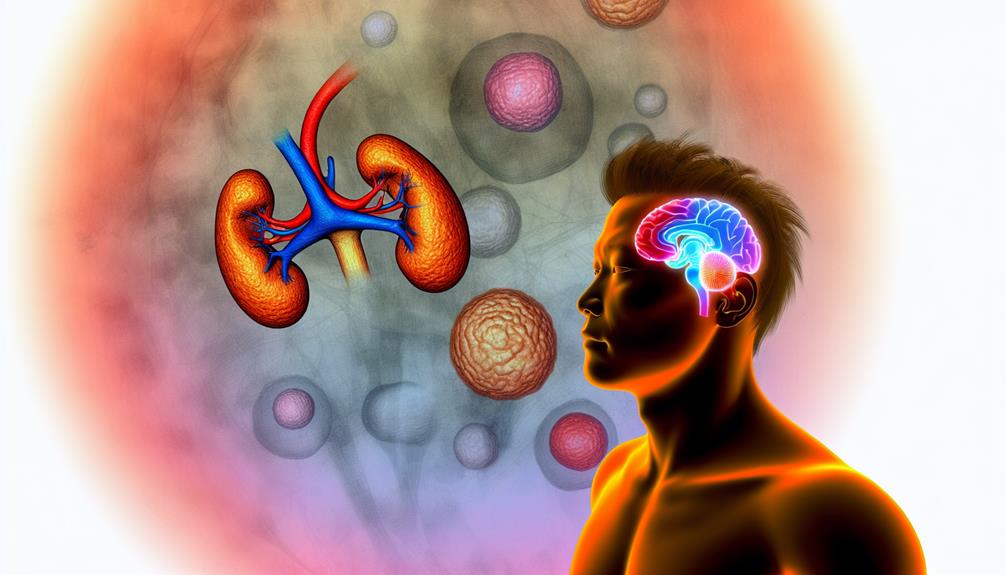If you're experiencing symptoms of adrenal issues affecting your male hormones, you might notice fatigue, decreased libido, and cognitive disturbances. Elevated cortisol levels can lead to chronic tiredness and mental fog, making it hard to concentrate. You may also feel mood swings or irritability due to hormonal imbalances. Additionally, weight gain, particularly around the abdomen, and muscle weakness can occur as testosterone levels drop. Skin changes, like reduced elasticity, and hair loss may further signal hormonal disruption. Understanding these interconnected symptoms is essential, and there's much more to uncover about adrenal health and its effects on male hormones.
Overview of Adrenal Glands

The adrenal glands, often overlooked, play an essential role in the body's endocrine system. Nestled atop each kidney, these small, triangular-shaped glands are essential for maintaining adrenal function and overall hormonal regulation. They produce a variety of hormones, including cortisol, adrenaline, and aldosterone, each serving distinct yet interconnected purposes in managing stress, metabolism, and blood pressure.
When I investigate the intricate processes of these glands, I find their contribution to homeostasis remarkable. For instance, cortisol, often dubbed the "stress hormone," is critical for energy regulation and anti-inflammatory responses. It's fascinating how the adrenal glands release cortisol in response to stress, ensuring the body can react appropriately to external challenges. Meanwhile, aldosterone plays a key role in fluid and electrolyte balance, influencing blood pressure and overall cardiovascular health.
Understanding adrenal function also involves recognizing the implications of hormonal regulation. Imbalances in hormone production can lead to various health issues, such as adrenal insufficiency or Cushing's syndrome. These conditions underscore the importance of monitoring adrenal health, especially in males, where hormonal fluctuations can greatly impact well-being.
As I explore deeper into the complexities of adrenal function, I realize that maintaining balance within these glands is essential for sustaining peak health. The interplay of hormones produced by the adrenal glands underscores their fundamental role in our body's ability to adapt and thrive amidst various physiological demands.
Importance of Male Hormones
Male hormones play a significant role in numerous physiological processes, influencing everything from muscle mass and energy levels to mood and reproductive health. Among these hormones, testosterone stands out as the most important, primarily produced in the testes and regulated by the endocrine system. Its importance cannot be overstated; testosterone not only contributes to the development of male secondary sexual characteristics but also plays a critical role in maintaining overall hormone balance.
When testosterone production is ideal, it supports various bodily functions, including the synthesis of proteins that help build muscle and enhance physical performance. Additionally, adequate testosterone levels are necessary for sustaining libido and fertility, which are fundamental aspects of male reproductive health. However, hormonal imbalances often arise due to factors such as stress or adrenal dysfunction, leading to decreased testosterone levels, which can have far-reaching consequences on both physical and mental well-being.
It's intriguing to observe how interconnected our hormonal systems are. For instance, adrenal glands produce hormones that can influence testosterone levels, and an imbalance in one area can lead to deficiencies in another. This interplay emphasizes the need for maintaining a healthy level of testosterone, as well as other hormones, to guarantee ideal function across various systems in the body. Understanding the importance of male hormones, particularly testosterone, is essential for anyone looking to improve their health and quality of life.
Common Symptoms of Adrenal Issues

When I consider the common symptoms of adrenal issues, fatigue and low energy frequently emerge as primary indicators. Additionally, mood swings and irritability can signal underlying hormonal imbalances. It's essential to recognize these signs, as they may reflect significant health concerns.
Fatigue and Low Energy
How often do we overlook the subtle signs of fatigue and low energy that can indicate deeper adrenal issues? I've found that many men dismiss chronic tiredness as a simple byproduct of a busy lifestyle. However, this persistent fatigue is often a hallmark of adrenal fatigue, a condition where the adrenal glands struggle to produce adequate hormones, particularly cortisol. When the body is under constant stress, whether from physical exertion or emotional strain, it can lead to an imbalance that disrupts energy restoration.
In my experience, the sensation of low energy isn't just a fleeting feeling; it can manifest as overwhelming exhaustion despite adequate sleep. This is a essential indicator that the adrenal system may be compromised. The body's inability to effectively manage stressors not only affects energy levels but can also impair overall hormonal balance, leading to further complications.
Recognizing these symptoms is important for addressing the underlying issues. A thorough approach that includes lifestyle changes, dietary adjustments, and stress management techniques can greatly improve adrenal function and, in turn, restore energy levels. Understanding the connection between fatigue and adrenal health is fundamental for reclaiming vitality.
Mood Swings and Irritability
Mood swings and irritability can often feel like unwelcome intruders in daily life, disrupting both personal and professional relationships. When I notice these emotional fluctuations, I can't help but connect them to potential adrenal issues. The adrenal glands play a vital role in regulating our stress response, and when they become compromised, my ability to maintain emotional regulation can diminish considerably.
Under normal circumstances, the adrenal glands release hormones like cortisol to help manage stress. However, chronic stress can lead to adrenal fatigue, which may result in erratic hormone levels. This instability often manifests as mood swings or irritability, making it difficult to maintain a stable emotional state. I find that small triggers can provoke disproportionately intense reactions, leaving me feeling drained and confused.
Understanding the link between adrenal health and emotional regulation is essential. By addressing underlying adrenal issues, I can improve my stress response and regain a sense of balance. Monitoring my stress levels and adopting stress-management techniques can help mitigate these emotional disturbances. Taking proactive steps to support adrenal function is not just beneficial—it's necessary for maintaining emotional stability in my daily life.
Fatigue and Low Energy Levels
Fatigue and low energy levels are often notable indicators of adrenal issues in males, affecting not just physical performance but also mental clarity and overall quality of life. When I've experienced adrenal fatigue, the relentless tiredness felt all-consuming, making simple tasks intimidating. This isn't just tiredness; it's a profound depletion that can hinder productivity and diminish enjoyment in life.
To better understand this condition, consider these important aspects:
- Physical Exhaustion: You might find yourself feeling drained even after a full night's sleep.
- Mental Fog: Difficulty concentrating or maintaining focus can accompany physical fatigue.
- Sleep Disturbances: You may struggle with insomnia or unrefreshing sleep, compounding energy deficits.
- Increased Cravings: The body often seeks sugar or caffeine for quick energy boosts, which can exacerbate adrenal fatigue.
Addressing these symptoms requires a strategic approach to energy restoration. First, identifying the root of the adrenal issues is essential, often through lifestyle changes, stress management, and dietary adjustments. Implementing regular, moderate exercise and ensuring adequate hydration can also help. I've found that incorporating adaptogenic herbs, like ashwagandha or rhodiola, may support adrenal function and enhance energy levels.
Ultimately, recognizing and addressing fatigue and low energy levels can lead to improved well-being and the restoration of liveliness. It's essential to take these signs seriously, as they can notably impact one's day-to-day life and long-term health.
Mood Swings and Irritability

During periods of adrenal distress, I've noticed that mood swings and irritability can manifest unexpectedly, often catching me off guard. This fluctuation in my emotional state seems tied to my body's impaired ability to regulate stress hormones, particularly cortisol. When adrenal function is compromised, the delicate balance of neurotransmitters that govern mood regulation can also be disrupted.
Consequently, I find myself oscillating between feelings of anger and sadness, sometimes triggered by seemingly minor events. This unpredictability can be frustrating and exhausting, both for me and those around me. My emotional resilience, which once allowed me to cope effectively with stress, appears diminished, making it increasingly challenging to maintain equanimity in daily interactions.
Research indicates that adrenal issues can lead to alterations in serotonin and dopamine levels, which are essential for emotional stability and well-being. As I navigate these changes, it becomes vital for me to adopt strategies that bolster my mood regulation. Practices such as mindfulness and regular physical activity have proven beneficial in mitigating the intensity of these mood swings.
Ultimately, recognizing the connection between adrenal health and emotional responses empowers me to take proactive steps. By addressing the underlying adrenal issues, I can work towards restoring my emotional resilience. I've learned that it's important to monitor these symptoms closely, as they can greatly impact my quality of life and relationships. Understanding this connection is the first step toward regaining control over my emotional landscape.
Decreased Libido and Sexual Dysfunction
A notable aspect of adrenal issues that I've experienced is a noticeable decrease in libido and instances of sexual dysfunction. This decline in sexual health can often be linked to adrenal fatigue, which disrupts the delicate hormonal balance necessary for male vitality. When the adrenal glands are compromised, testosterone levels can drop, leading to challenges like erectile dysfunction and diminished sexual desire.
In my journey, I've realized the importance of addressing these symptoms thoroughly. Here are some key observations:
- Testosterone therapy can be a viable option for some, aiming to restore hormonal levels.
- Libido enhancement strategies, including lifestyle changes and nutritional support, can complement medical interventions.
- Erectile dysfunction is not just a physical issue; it often intertwines with psychological factors exacerbated by stress and fatigue.
- Hormone replacement therapy may be necessary for those with notable hormonal imbalances, but it's essential to approach this under medical supervision.
Understanding the root causes of decreased libido and sexual dysfunction is imperative for regaining control over one's sexual health. It's important to evaluate both medical and lifestyle factors when seeking solutions. By addressing adrenal fatigue and restoring hormonal balance, I've found that not only can sexual health be improved, but overall well-being can also be greatly enhanced. Seeking professional guidance through this process has been invaluable, as maneuvering these changes alone can often feel overwhelming.
Weight Gain and Body Changes

Many individuals experiencing adrenal issues notice considerable weight gain and body changes that can be frustrating and concerning. As I explore this topic, it's essential to understand that the adrenal glands play an important role in regulating hormones that influence metabolism and stress response. When these glands are compromised, the hormonal imbalance can lead to increased fat accumulation, particularly around the abdomen, and altered body composition.
In my experience, making dietary adjustments is essential to combat these changes. A diet rich in whole foods, lean proteins, and healthy fats can help stabilize blood sugar levels and reduce cravings. I've found that incorporating nutrient-dense foods not only supports overall health but also improves energy levels, which is critical when motivation dips due to adrenal fatigue.
Alongside dietary modifications, I've discovered that exercise routines tailored to my energy levels can greatly impact weight management. While high-intensity workouts may seem appealing, I often opt for moderate exercises like walking or yoga, which are less taxing on the body. Strength training is also beneficial, as it can boost metabolism and promote muscle retention.
Tracking progress in both diet and exercise helps me stay accountable, allowing for necessary adjustments as my body responds. Ultimately, understanding the connection between adrenal health and body changes empowers me to take control of my well-being, fostering a proactive approach to managing weight gain and improving overall health.
Sleep Disturbances and Insomnia
I've observed that hormonal imbalances can greatly affect sleep quality, particularly through disruptions in cortisol levels. Elevated cortisol, often linked to stress, can lead to persistent insomnia and other sleep disturbances. Understanding stress management techniques becomes essential for addressing these adrenal-related sleep issues effectively.
Hormonal Imbalance Effects
Hormonal imbalances can greatly disrupt sleep patterns, leading to disturbances like insomnia that affect daily functioning. I've experienced firsthand how adrenal fatigue and hormonal fluctuations can cause restless nights. When my hormones are out of sync, it feels like my body's natural rhythms are thrown off, making it difficult to fall asleep or stay asleep.
Here are some key effects I've noticed:
- Increased difficulty in falling asleep, often lying awake for hours.
- Frequent awakenings during the night, leading to fragmented sleep cycles.
- Excessive daytime fatigue, impacting my productivity and mood.
- Heightened anxiety or stress levels, which can exacerbate sleep issues.
These symptoms stem from the delicate interplay of hormones governed by the adrenal glands. When adrenal fatigue occurs, it disrupts the balance of essential hormones like cortisol and testosterone, leading to increased sleep disturbances. The resulting hormonal fluctuations not only impact sleep but also contribute to a cycle of fatigue and stress. Understanding this relationship has been significant for me in addressing these issues, and it may help you recognize the importance of balancing your hormones for better sleep health.
Cortisol Levels and Sleep
Cortisol, often referred to as the "stress hormone," plays a critical role in regulating various bodily functions, including sleep. I've found that elevated cortisol levels can notably disrupt cortisol regulation, leading to sleep disturbances and insomnia. When cortisol remains high, typically due to chronic stress, it alters the natural circadian rhythm, which is essential for ideal sleep quality.
During the night, cortisol levels should decrease, allowing the body to shift into deeper sleep stages. However, when this regulation is thrown off, it can lead to difficulty falling asleep or staying asleep, resulting in a reduced overall sleep quality. I've noticed that even slight increases in cortisol can make it hard for me to achieve restorative sleep, leaving me feeling fatigued and irritable during the day.
Moreover, the interplay between cortisol and other hormones, such as testosterone, can further exacerbate these sleep issues. Understanding the relationship between cortisol levels and sleep has been pivotal for me in recognizing how adrenal health directly impacts my rest and recovery. If you're experiencing similar sleep challenges, it may be worthwhile to examine your cortisol levels and overall adrenal function.
Stress Management Techniques
Many individuals struggle with sleep disturbances and insomnia due to elevated stress levels, which can be managed through effective techniques. I've found that incorporating specific strategies can greatly enhance sleep quality and overall well-being.
Here are some techniques that have worked for me:
- Mindfulness Practices: Engaging in mindfulness can ground your thoughts and reduce anxiety.
- Breathing Exercises: Simple, deep breathing exercises can activate the body's relaxation response, promoting better sleep.
- Yoga Benefits: Regular yoga practice not only enhances flexibility but also calms the mind, making it easier to drift into sleep.
- Journaling Benefits: Writing down thoughts before bedtime can clear mental clutter, making it easier to relax.
In addition to these, prioritizing time management and physical activity during the day can help regulate cortisol levels. Exploring different meditation styles and creative outlets can also provide considerable stress relief. Finally, nature exposure can rejuvenate the mind, leading to improved sleep. By implementing these stress management techniques, I've noticed a marked improvement in my sleep quality and overall health, and I encourage you to explore these options for yourself.
Muscle Weakness and Loss

Muscle weakness and loss can be significant indicators of underlying adrenal issues in males. I've noticed that when I experience adrenal fatigue, it feels like my body just can't recover from workouts as it used to. This fatigue can lead to a decrease in testosterone levels, further exacerbating issues related to muscle mass and strength. It's important to address these symptoms early on to prevent long-term damage.
In my journey, I found that understanding the relationship between adrenal health and muscle recovery was essential. When the adrenal glands are overworked, they may not produce enough hormones like cortisol, which is crucial for energy and recovery processes. This deficiency can manifest as persistent fatigue and difficulty in maintaining muscle tone.
Here's a quick overview of how adrenal issues can impact muscle health:
| Symptom | Description |
|---|---|
| Adrenal Fatigue | Chronic tiredness affecting daily life |
| Muscle Weakness | Decreased strength and endurance |
| Impaired Recovery | Longer time needed for muscle repair |
Recognizing these signs is crucial. If you're experiencing muscle weakness and loss, it may be time to consult a healthcare professional. Addressing adrenal issues not only improves muscle recovery but also enhances overall well-being. Taking proactive steps can help restore your energy levels and regain your strength. Remember, the sooner you act, the better your chances of recovery.
Cognitive Issues and Brain Fog
I've noticed that hormonal imbalances can notably impact cognitive function, leading to symptoms like brain fog. This often manifests as difficulty concentrating and memory lapses, which can be exacerbated by chronic stress. Understanding the connection between adrenal health and cognitive performance is essential for addressing these issues effectively.
Hormonal Imbalance Effects
Cognitive clarity is often compromised when hormonal imbalances arise, particularly in males experiencing adrenal issues. The intricate relationship between testosterone regulation and adrenal fatigue can lead to significant cognitive impairments. I've noticed that when my hormones are out of balance, my mental sharpness diminishes, making it difficult to focus on tasks or think critically.
The effects of hormonal imbalance on cognitive function can manifest in various ways, including:
- Decreased concentration: Difficulty maintaining attention on tasks or conversations.
- Memory lapses: Increased forgetfulness and challenges recalling information.
- Mental fatigue: A constant feeling of tiredness despite adequate sleep.
- Mood fluctuations: Heightened irritability or feelings of anxiety that cloud judgment.
These symptoms highlight the importance of proper testosterone regulation, as low levels can exacerbate feelings of brain fog and cognitive decline. Understanding the underlying adrenal issues is vital for addressing these cognitive challenges effectively. By recognizing how adrenal fatigue impacts our hormonal balance, we can take proactive steps to restore cognitive function and improve overall mental clarity.
Stress and Cognitive Function
Stress's impact on cognitive function can be profound, especially for those grappling with adrenal issues. I've noticed that heightened cortisol levels, often a result of chronic stress, can lead to significant cognitive decline. This decline manifests as brain fog, difficulty concentrating, and reduced short-term memory. The adrenal glands play a vital role in managing our stress response, and when they're overtaxed, our cognitive abilities can falter.
Moreover, I've found that stress resilience—our ability to adapt and recover from stress—can diminish with ongoing adrenal fatigue. This reduced resilience compounds cognitive challenges, creating a vicious cycle. When stress becomes chronic, the brain's neuroplasticity may be impaired, further contributing to cognitive decline.
In my experience, addressing these issues involves not only managing stress through techniques like mindfulness and exercise but also supporting adrenal health. By fostering an environment that enhances stress resilience, I've been able to mitigate some cognitive effects. It's essential to recognize the interplay between stress and cognitive function, particularly for men facing adrenal issues, as understanding this relationship can inform effective strategies for recovery and improved mental clarity.
Skin Changes and Hair Loss

When it comes to adrenal issues in males, skin changes and hair loss can serve as significant indicators of underlying hormonal imbalances. I've noticed that fluctuations in adrenal hormones can drastically affect various aspects of skin and hair health. For instance, decreased adrenal function often leads to reduced skin elasticity and hydration, making the skin appear dull and aged. Furthermore, pigmentation changes can manifest, resulting in uneven skin tone.
Hair thinning is another prevalent concern. As adrenal issues arise, many men may experience an increase in hair loss, especially on the scalp and facial hair. This is often compounded by dandruff issues, which can further aggravate scalp health and hinder hair regrowth. It's essential to address these symptoms early on.
Here are some key points to take into account:
- Skin Elasticity: Hormonal imbalances can weaken skin structure.
- Hair Thinning: Reduced hormone levels lead to weaker hair follicles.
- Scalp Health: Proper scalp care is important for preventing dandruff and promoting regrowth.
- Facial Hair Changes: Hormonal fluctuations affect facial hair density and growth patterns.
Understanding these changes can empower you to seek appropriate interventions. Maintaining good skin hydration and addressing scalp health are fundamental steps in countering these symptoms. Recognizing the interplay between adrenal function and skin/hair health can ultimately guide us toward regaining balance and well-being.
Impact on Metabolism
Metabolism serves as the body's engine, driving energy production and utilization, and adrenal issues can greatly disrupt this process in males. When I think about adrenal fatigue, it's essential to understand how it can lead to significant metabolic disturbances. The adrenal glands produce hormones like cortisol that regulate various metabolic functions, including glucose metabolism and fat storage. When these glands become fatigued, as seen in conditions like adrenal fatigue, the body struggles to maintain energy balance.
This disruption can result in a cascade of metabolic syndrome symptoms. For instance, I've observed that individuals experiencing adrenal fatigue often report increased cravings for carbohydrates, leading to weight gain, particularly around the abdominal area. This is concerning, as it not only affects physical appearance but also increases the risk of developing insulin resistance, a key component of metabolic syndrome.
Moreover, the interplay between adrenal issues and metabolic health is complex. Reduced cortisol levels can impair the body's ability to metabolize fats and sugars efficiently, contributing to fatigue and lethargy. I've noted that this ongoing struggle can create a vicious cycle, where metabolic dysfunction exacerbates adrenal issues, further hindering energy production.
Seeking Diagnosis and Treatment

Symptoms related to adrenal issues can often mimic other health conditions, making accurate diagnosis challenging. When I sought help, I realized the importance of thorough hormonal testing to differentiate adrenal fatigue from other hormonal disorders. It's vital to approach this matter systematically.
Here are some key considerations I discovered during my journey:
- Diagnostic procedures: Blood tests, saliva tests, and imaging can provide insights into adrenal function.
- Treatment options: Depending on the diagnosis, options may include hormone therapy or herbal remedies to restore balance.
- Lifestyle changes: Implementing stress reduction techniques, such as mindfulness or yoga, can greatly improve adrenal health.
- Dietary adjustments: A balanced diet rich in nutrients supports adrenal function and overall hormone regulation.
After identifying the underlying issues, I found several effective treatment options. Lifestyle changes played a pivotal role. For instance, prioritizing stress reduction through meditation and regular exercise has proven beneficial. Additionally, I consulted support groups that provided invaluable emotional support and shared experiences.
I also explored dietary adjustments that tailored to my adrenal health, focusing on whole foods and reducing processed items. This holistic approach, combined with professional guidance, helped me regain energy and hormonal balance. Remember, it's essential to work with healthcare professionals who understand adrenal issues to navigate the complex landscape of symptoms and treatments effectively. Each individual's path to recovery is unique, and finding the right balance can take time and patience.
Frequently Asked Questions
Can Adrenal Issues Affect Fertility in Men?
Absolutely, adrenal issues can greatly impact fertility in men. I've seen how adrenal fatigue can lead to a hormonal imbalance, disrupting testosterone levels and overall reproductive health. This imbalance can affect libido, sperm production, and even overall energy levels. It's essential to address adrenal health, as restoring balance can enhance fertility outcomes. If you're experiencing symptoms, consider consulting a healthcare professional to explore potential underlying adrenal issues and appropriate interventions.
Are There Natural Remedies for Adrenal Dysfunction?
Oh sure, if only my adrenal glands could just take a vacation! But alas, they can't. For tackling adrenal dysfunction, I've found that herbal supplements like ashwagandha and rhodiola can be quite helpful. Also, making dietary changes—think more whole foods and less processed junk—can support adrenal health. While these remedies aren't magic potions, they've worked wonders for me, promoting balance and liveliness when my adrenal system felt like a circus act.
How Do Stress Levels Influence Adrenal Gland Function?
I've learned that stress levels profoundly influence adrenal gland function through the stress response. When stress is chronic, it can lead to adrenal fatigue, where the glands become overworked and struggle to produce necessary hormones. This imbalance can contribute to various health issues. By managing stress effectively, I've noticed improvements in my overall well-being. Techniques like mindfulness and regular exercise can greatly help in supporting adrenal function and reducing fatigue.
What Lifestyle Changes Can Improve Adrenal Health?
To improve adrenal health, I've found that making specific lifestyle changes can be essential. First, I focus on dietary adjustments, emphasizing whole foods and reducing sugar intake. Incorporating healthy fats and proteins has also helped. Additionally, I've established consistent exercise routines, balancing strength training with relaxation techniques like yoga. These changes not only support my adrenal function but also enhance my overall well-being, allowing me to manage stress more effectively.
Is There a Genetic Predisposition to Adrenal Problems?
I've often wondered about genetic predisposition to adrenal problems. Research indicates that specific genetic markers can increase the risk of adrenal disorders. These markers may influence how our adrenal glands respond to stress and hormone regulation. While environmental factors play a significant role, understanding the genetic component can help in identifying individuals who may be more susceptible to these issues. It's essential to evaluate both genetics and lifestyle for peak adrenal health.
